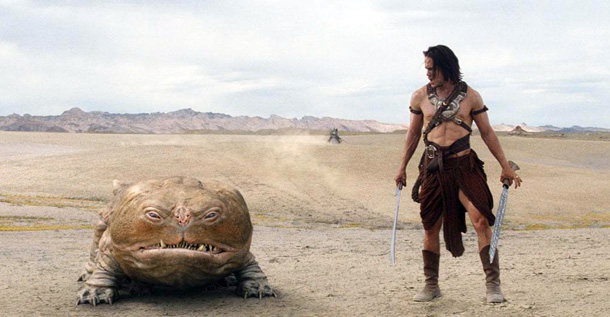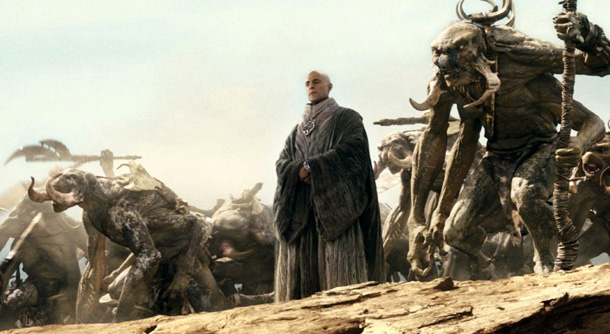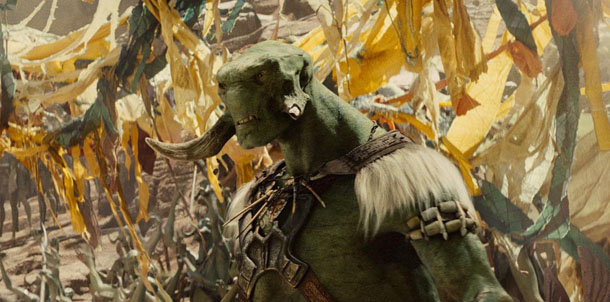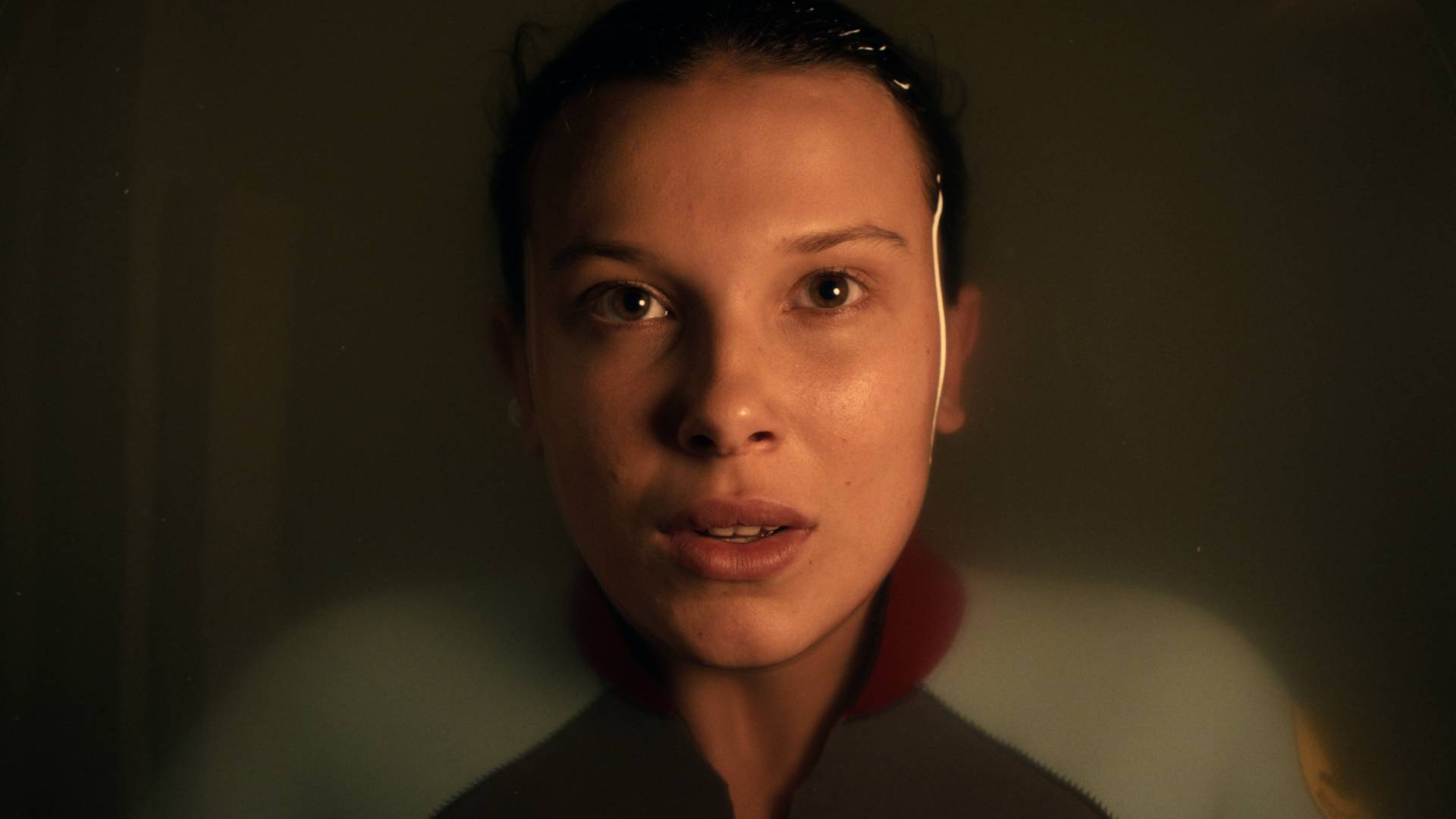Isnt It About Time You Gave John Carter Another Chance?
In an unprecedented move, SFX ’s regular courtroom debate tackles a film so new that it's still in cinemas. The reason? People have already given up on poor John Carter . Jayne Nelson wants to change their minds...

Case for the defence: Your Honour and ladies and gentlemen of the jury, we present to you today a special case: John Carter .
Case for the prosecution: Arguing for a film that's still showing in cinemas? What has the world come to? What next – arguing the case for Michael Bay’s travesty of a Teenage Mutant Ninja Turtles movie ?
Case for the defence: John Carter is a special case, because it needs another chance so soon, because its first chance was squandered by an almost unprecedented avalanche of bad press. You all know about John Carter . It’s showing at your local cinema, although not to very many people. Most of its potential audience – which should have been huge, as it spans all generations – are staying away in droves. It’s being described in the press as “the greatest flop of all time”. Disney has announced that it stands to lose $200 million on the film; thank heavens it has The Avengers on the way or Mouse House execs would probably be jumping out of skyscraper windows.
And yet... none of this is deserved. John Carter is actually jolly good fun, nowhere near as bad as some people say it is and definitely undeserving of the bile dished out by The Guardian , for example. SFX gave it a cheerful four-star review , and we know a half-decent sci-fi movie when we see one (as do you, honoured jury members).
John Carter is based on a classic, iconic story and has an excellent cast, top-notch FX and a whole load of balls. Check out its 7.0 rating on the IMDb; not an exact science, we’ll admit, but it’s way better than you’d expect for a movie that’s supposed to be so dreadful. Word of mouth from people who actually bothered to go and see it has been good... It’s getting people into cinemas in the first place that's the problem.
Case for the prosecution: Why should anyone risk spending money on a cinema ticket on a film so widely panned? Better to wait until it comes on TV to make up your mind. SFX has already argued that the film’s flop was a self-fulfilling prophecy . It’s not like John Carter is the Citizen Kane of sci-fi, for heaven’s sake. It's not that good a film. It’s overlong, it’s confusing for kids, it rips off a million other films. In short, we’ve seen it all before!
Weekly digests, tales from the communities you love, and more

Case for the defence: It’s not perfect, we agree – and, to be fair, the SFX review did point out some flaws. But it’s still better than much of the codswallop that does do well in cinemas: it’s not a thinly veiled attempt to make money with no discernible plot, á la Transformers . It’s not just an excuse to ogle million-dollar FX shots or sell tie-in merchandise. It’s got warmth, a heart, and a lot of charisma. And as for the “ripping off” - as anyone who’s actually read the Edgar Rice Burroughs Barsoom series can tell you, other stories have been ripping it off for decades. Everything you think you’ve seen before in John Carter, such as the fight in the arena with the giant monsters that also happened in Attack Of The Clones , was actually stolen from the books in the first place!
Case for the prosecution: You’re saying that if John Carter had been filmed first, we’d all love it? That sounds a bit simplistic to us.
Case for the defence: Well, people have been trying to make it for decades. Who knows what could have happened if they’d succeeded? We’d be accusing Star Wars and Avatar of stealing from it, instead of vice versa!
Case for the defence: It's because the film’s marketing was cocked up*. The marketing failed to let audiences know that this mysterious, unknown “John Carter” was already a hundred years old and had been created by the man who also created Tarzan. You’d think that would be quite important, wouldn't you? But no, not a single poster mentioned our loin-clothed pal. Thus, without any way of establishing who John was or where he came from, he may as well have been some bloke made up for this movie and named after that guy on ER . By assuming everybody knew who he was when they didn't, they turned an iconic character into a nobody.
( *For the record, some insiders say it wasn't entirely the marketing department's fault; Stanton and his team may have made some of these decisions themselves. Who knows? The end result was the same, alas.)
Case for the prosecution: Your Honour, let the record state that we agree with the defence on this point. The marketing team at Disney really stuffed this one up.
Case for the defence: But that’s not all they did. They had two-time Oscar-winning Andrew Stanton directing their blockbuster movie, but they failed to tell anybody. Did it say anywhere on the John Carter posters “From the man who brought you Toy Story and WALL-E ”? Did it buggery. All the posters said was “John Carter” in big letters. You know, that guy nobody had ever heard of.
Case for the prosecution: Hmm. This is a very strange case. We agree with the defence almost wholeheartedly. This isn’t supposed to happen. It's... unsettling.

Case for the defence: Don't even get us started on the fact they dropped the word “Mars” from the title. They seemed to be terrified that they had a – gasp! - science-fiction film to sell.
Case for the prosecution: Your honour, speaking personally for a moment here, I'm afraid I’m starting to come at this from a different perspective to the one my learned colleague is presenting.
Case for the defence: Which is?
Case for the prosecution: As a lifelong science-fiction fan, I actually feel insulted by the way the makers of John Carter refused to acknowledge their film is sci-fi. I feel as though they don’t deserve any support at all for looking down on a genre that I love.
Case for the defence: Aha! Which is exactly why we are so vehement that people need to see the film! It’s glorious, unashamed, unadulterated science-fiction – the kind of film that would have blown our minds as children. It’s ironic that a film company too scared to mention another planet in the film's title have produced something so perfectly science-fiction!

Case for the prosecution: Oh, come on. Surely not! This film is nothing more than a bunch of ugly aliens running around in a desert.
Case for the defence: That's racist, you know. What did the Tharks ever do to you?
Case for the prosecution: We have no patience for silly CGI creatures. Usually they do nothing except ruin a movie. They just don't look real!
Case for the defence: On the contrary, the Tharks are beautifully designed and rendered, with excellent voice actors and a well-realised culture – thanks to the books. They’re hardly gratuitous nonsense. By the end of the film you empathise with them.
Case for the prosecution: And then there’s Taylor Kitsch, who spends the whole film shirtless so the ladies are enticed into cinemas to see him. Clearly his chest wasn't even impressive enough to fulfill that goal!
Case for the defence: Kitsch’s chest is a damn fine one, we’ll have you know. Just because he didn’t bulk up like Arnie in a Conan film doesn’t make him a failure. He wanted to keep John true to the men of the time – during the American Civil War there weren’t many bodybuilders wandering around, and his physique matches that perfectly.

Case for the prosecution: Bah. At least the film has Lynn Collins looking rather ravishing in a barely-there dress or two. We’ll allow that this doesn’t hurt our desire to go and see it, although it’s a huge cliché that the woman has to show that much cleavage in a fantasy movie, isn't it?
Case for the defence: If Kitsch is half-naked, why shouldn'’ his co-star be, too? Otherwise it’s reverse sexism! And wait a moment... when you say she “doesn’t hurt your desire to go and see it”... does this mean you haven’t yet? Are you arguing all of this from hearsay? Are you arguing against this film based merely on what you've read in the press about it?!
Case for the prosecution: Erm… yes.
C ase for the defence: But how can you so vehemently dislike a movie you haven’t even seen? That’s outrageous!
Case for the prosecution: It’s what audience have been doing. Ask people on the street what they think of John Carter and they’ll tell you it’s a stinker, even if they haven’t seen it. You don’t need to see it. There’s been enough written and said about it to know . A good film would not get that much bad press.
Case for the defence: Which proves my entire argument! Judging a film without seeing it is not only self-defeating, it’s also cruel! Give the bloody thing a chance before you slag it off – it's the decent thing to do! After all, Blade Runner was a flop too. Flop doesn’t automatically equal turkey.
Case for the prosecution: So it’s not talky, overlong, bogged down in muddily portrayed Martian politics and badly structured?
Case for the defence: Well…
Case for the prosecution: So not everything I’ve heard is wrong?
Case for the prosecution: I didn’t see that in the trailers.
Case for the defence: No. Unusually, all the best bits of the film aren’t in the trailer. Another bizarre marketing choice.
Case for the defence: That’s our point. So many people are saying John Carter is bad that, somehow, it’s become bad by association. But it’s not! Don’t let the bad press, poor marketing campaign and financial losses ruin your chance to see a beautiful, fun movie that really does bring John Carter to life. Andrew Stanton loved Burroughs’ books from childhood and it's a tragedy that his attempt to bring them to the screen has met with such derision. The boy done good – it’s everybody else that’s done bad. It’s all the hoohaw around John Carter that's destroying it, not the quality of the film itself.
Go to see John Carter , ladies and gentlemen of the court. Make up your own minds, pay Disney back a few of their dollars, and help to dispel the incorrect and incredibly insulting myth that nobody wants to see a sci-fi film. You may thank us. If not, it's not like it cost you $200 million, is it?
SFX Magazine is the world's number one sci-fi, fantasy, and horror magazine published by Future PLC. Established in 1995, SFX Magazine prides itself on writing for its fans, welcoming geeks, collectors, and aficionados into its readership for over 25 years. Covering films, TV shows, books, comics, games, merch, and more, SFX Magazine is published every month. If you love it, chances are we do too and you'll find it in SFX.


